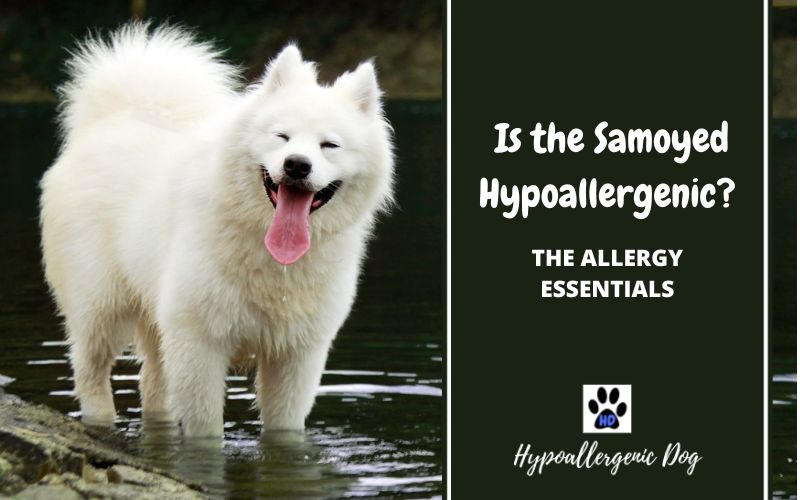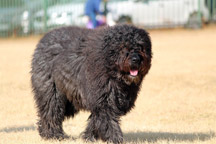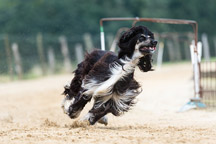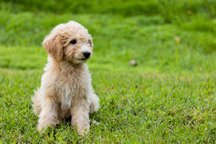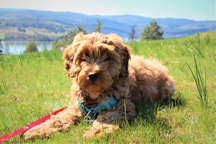Are Samoyeds Hypoallergenic?
Yes! The Samoyed is a medium to large sized hypoallergenic dog breed that has low dander levels and hardly drools … but sheds a lot!
Known for its beautiful smile and fluffy white coat, the Samoyed dog breed is a medium to large hypoallergenic dog. This Siberian dog makes it onto the hypoallergenic list because it has low dander levels and doesn’t drool, and its proteins are less irritating to allergy sufferers that other breeds. It does, however, shed … a lot! If you are looking for a non-shedding dog, the Samoyed is not for you! If you are looking for a cuddly, friendly family dog, and don’t mind white dog hair around your house, keep reading!
For a quick summary of the Samoyed, skip to our Samoyed dog breed summary further down the page.
Samoyed Quick Facts
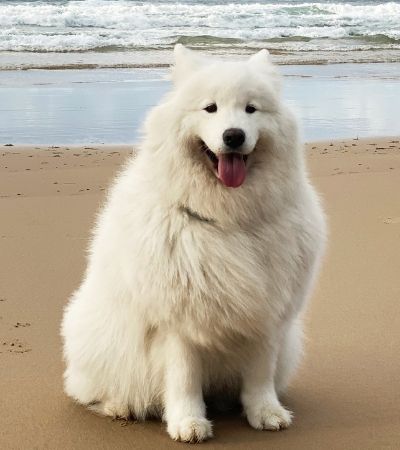
The Samoyed, or Smiley Sammy is famous for its beautiful white coat and big dark eyes. Its fluffy triangular ears are fox-like and add to it’s keen, intelligent look. Standing 19 to 23 inches (48 – 60cm) tall and ranging from 35 to 65 pounds (16 – 30kg), the Samoyed can either be considered a medium or large dog.
The Samoyed coat is a double-layer coat, with a very thick undercoat and overcoat of long guard hairs. These coats are designed for keeping the Samoyed warm in Siberian winters as they live and work outside in extreme cold. Don’t be fooled, though, the coat also provides good insulation against the summer heat, so it’s important not to clip their coat. Instead, ensure you provide extra water in summer, and them regularly and keep their coat in good condition.
The Samoyed coat sheds seasonally. The Sammy blows all its undercoat twice a year. This intense shed is best managed with increased daily brushing outside for the days/weeks while the old coat sheds. The soft undercoat is a bit like wool on a sheep, and can be gathered, washed, spun into yarn and knitted! Although these dog shed quite a bit, they are still known to be one of the hypoallergenic breeds that are less likely to bother people with dog allergies. They are rather unique in being hypoallergenic, because they are medium-large and fluffy, where as most hypoallergenic dogs are smaller and have hair that’s curly or silky and straight.
The Samoyed, despite its shedding, actually produces less dander than most breeds. Interestingly enough, the upturned corners of its mouth, which have earned it the nickname the “Sammy Smile”, are also responsible for it drooling less! This facial feature helped the Samoyed not to form icicles around its face in harsh, cold climates.
Samoyed Temperament
Samoyed dogs are a gentle, very patient breed. Their happy-go-lucky nature is reflected in their famous “Sammie Smile.” They are amazing with kids, loving, infinitely patient, inquisitive, and affectionate. These guys are true family dogs who love being involved in your lives. They do bark a decent amount, but don’t rely on them as guard dogs because their happy, friendly demeanor will not ward off intruders. With good socialization and plenty of affection when they are young, your Samoyed will be a loyal, long lasting family member for years to come.
Are you considering adopting an Samoyed?
Here’s what to watch out for :
- Samoyeds are very people-orientated dogs and will get destructive if left by themselves for too long.
- Samoyeds shed quite a bit and require constant grooming. However, they also drool very little due to the structure of their snouts, and they produce less dander than most dog breeds so they’re still hypoallergenic.
- Do you live in a hot climate? Samoyeds aren’t good in hot weather. They need plenty of exercise, but they overheat quickly, and their coats should not be trimmed. These are definitely cold weather dogs!
The Samoyed, or Smiley Sammy is famous for its beautiful white coat and big dark eyes. Its fluffy triangular ears are fox-like and add to it’s keen, intelligent look. Standing 19 to 23 inches (48 – 60cm) tall and ranging from 35 to 65 pounds (16 – 30kg), the Samoyed can either be considered a medium or large dog.
The Samoyed coat is a double-layer coat, with a very thick undercoat and overcoat of long guard hairs. These coats are designed for keeping the Samoyed warm in Siberian winters as they live and work outside in extreme cold. Don’t be fooled, though, the coat also provides good insulation against the summer heat, so it’s important not to clip their coat. Instead, ensure you provide extra water in summer, and them regularly and keep their coat in good condition.
The Samoyed coat sheds seasonally. The Sammy blows all its undercoat twice a year. This intense shed is best managed with increased daily brushing outside for the days/weeks while the old coat sheds. The soft undercoat is a bit like wool on a sheep, and can be gathered, washed, spun into yarn and knitted! Although these dog shed quite a bit, they are still known to be one of the hypoallergenic breeds that are less likely to bother people with dog allergies. They are rather unique in being hypoallergenic, because they are medium-large and fluffy, where as most hypoallergenic dogs are smaller and have hair that’s curly or silky and straight.
The Samoyed, despite its shedding, actually produces less dander than most breeds. Interestingly enough, the upturned corners of its mouth, which have earned it the nickname the “Sammy Smile”, are also responsible for it drooling less! This facial feature helped the Samoyed not to form icicles around its face in harsh, cold climates.
Above all, your Samoyed needs love, affection, and involvement in your family life. It is best to provide Sammies with easy access to a yard to roam freely while at home, and of course take them out daily to an open space for a fast walk or jog. Without consistent exercise every day, your dog may become bored, agitated and anxious. In the summertime, try to keep outdoor play to the cooler hours of the day; this breed’s thick coat can cause it to overheat. Be sure to provide them with plenty of water.
Samoyeds are accepted in apartment complexes, but this breed is very energetic and requires regular exercise and entertainment. If they are bored, they can become destructive.
You’ll also want to give your Samoyed a chew toy, such as a ball or a Kong beehive that can be stuffed with peanut butter or other treats. If you spend long hours at work, it is essential that you provide them with an outlet for their boredom. If not, they will find ways of amusing themselves by chewing on couches, shoes, and other personal belongings. You might want to consider hiring a pet sitter or dog walker who can entertain your Samoyed while you are away.
Although they are highly intelligent and known for their happy-go-lucky attitude, these dogs can be stubborn. It is best to start training while they are young or still in the puppy phase, as an adult Samoyed will be more difficult to train. Basic commands such as “come” and “sit” are especially important. Training a dog in these basic commands is how a bond is created. In order for you to engender trust, your dog must respect you. Establishing yourself as the “alpha dog” is an important part of this training. The earlier you start training, the easier it will be for your dog to socialize with other animals and people in the future. Socialize them as often as possible and allow your pet to intermingle with other dogs, adults and children.
Exercise Needs
It is vital to allow around an hour each day to take your Samoyed for a walk and run. Getting involved in an activity that gives your dog both a mental and physical challenge helps keep your Sammy stimulated and satisfies their intelligent nature. Agility training is both fun and challenging, and it helps to burn off energy. For those that live in hot climates, we recommend treadmill training your Samoyed. Samoyeds are not natural swimmers, so swimming should be introduced slowly and gently. Be careful to provide your Samoyed with plenty of water and shade because they are sensitive to the heat.
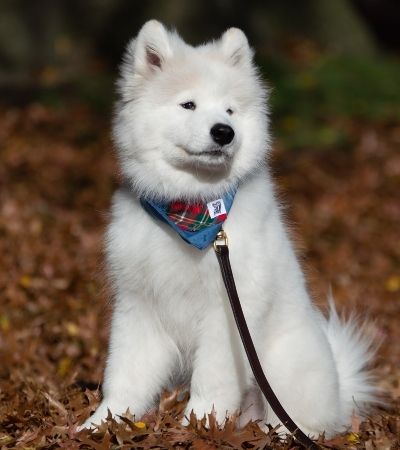
These dogs tend to shed quite a lot, but the majority of their shedding occurs seasonally, when they lose their entire undercoat over a period of a few weeks.
Unlike many of the other hypoallergenic dog breeds, these guys require a lot more maintenance. Their thick coat sheds somewhat throughout the year, and requires daily brushing to maintain its fine appearance. In addition to a bi-weekly grooming routine, you’ll need to brush your Samoyed daily. Furminator brushes have special teeth and a vacuum hose attached to pull away loose hair from the coat and are usually a good choice. If you suffer from dog allergies, it’s recommended that someone else in your home takes responsibility for daily brushing.
The Samoyed coat sheds seasonally, meaning the undercoat completely sheds or ‘blows’.
If your Samoyed happens to get muddy or extremely dirty, bathing them will be difficult and probably very costly. Expect to pay anywhere from $75-$150 just for a haircut and bath alone. Due to the thickness of their fur, a professional groomer may need to use special tools and techniques to clean and strip away excess hair. Feel free to bath your Sammy yourself, but expect to use a lot of towels drying them! Training them to be comfortable with blow dryers from an early age is a good idea.
Teeth, Ears and Nails
Most breeds need a weekly nail trimming and their ears should also be checked once a week. Dental hygiene is also a necessary task for your Samoyed but is often overlooked. Brushing their teeth at least 2-3 times a week can prevent gum disease and tartar buildup. Doing so will also allow you to see any teeth that may be broken or missing.
Like most hypoallergenic dogs, the Samoyed does have a variety of health conditions that begin to arise as they age, but they don’t acquire as many as other breeds. Their genetics are mostly natural; humans have done very little to manipulate the built-in qualities of this dog. This is why the Samoyed has a better bill of health than most large hypoallergenic dogs! Issues with hip dysplasia are very common in most dogs, so you should expect to see this later in life, especially if you allow your Samoyed to become overweight.
Maintain a regular exercise regime, a healthy diet and good grooming standards. Keep up to date with their vaccinations, and of course, provide them with plenty of love, affection and stimulation. If you do that, you can expect to have a happy and healthy Sammy for many years to come!
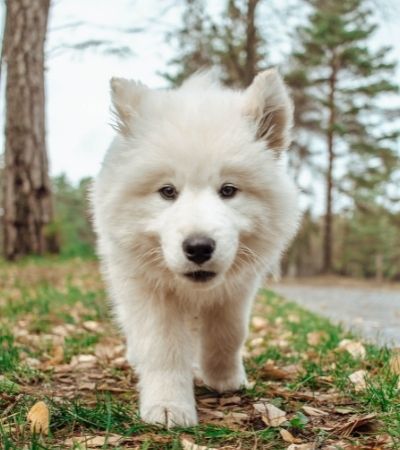
They may not be the most popular breed, but out of hundreds of different kinds of dogs, the Samoyed is number 61 in popularity according to the American Kennel Club (AKC). The nomadic tribe Samoyedic, or Nenet, were the first to give these dogs a name. Located in the Siberian Tundra of Russia, the nomads have used this breed to help them survive the harsh climate, hunt, pull sleds, and herd reindeer. Later in history, the breed was discovered and imported to England.
If you have bad allergies and decided you want a Samoyed for your home, you don’t have to break the bank. Surprisingly, pure-bred dogs end up in rescue facilities and shelters after being given to people as gifts or puppies. Adopting a Samoyed from a shelter will provide you with the full package! If you have dog allergies, but are considering a Samoyed, it’s recommended that you spend some time with these dogs before committing to owning one. You can speak with reputable breeders or dog shelters, or visit dog shows to ensure you have a chance to try before you buy!
Samoyed FAQ
Do Samoyeds Shed a Lot?
Yes they do! They shed throughout the year a bit, but they shed their entire undercoat twice a year, and grow a new summer coat and a winter coat! If you are looking for a low-shedding, low maintenance dog, this is not the dog for you. If you want a dog to care for and have LOTS of time to devote to them, you will enjoy the hours of companionship and cuddling with your soft, fluffy, hypoallergenic shedder. Although their coat sheds a lot, they are still considered hypoallergenic because they have surprisingly low dander levels and their proteins are different to other dogs, causing somewhat less irritation for many people.
Are Samoyeds good with kids?
Samoyeds are excellent with kids!
Are Samoyeds outdoor dogs?
No! It’s not safe to leave your Samoyed outside if you’re not around. They overheat easily, and they are also amazing escape artists!
Are Samoyeds expensive?
Samoyeds cost about $1,600. Be careful of breeders that undercharge for Samoyed puppies – they may not be as invested in the health and wellbeing of their dogs! Never buy a Samoyed puppy from a store.
How can I adopt a Samoyed?
Visit the national Samoyed rescue website here.
Do Samoyeds bark a lot?
It varies. If you live in a densely populated area and you leave your Sammy alone a lot, they can bark quite a bit. Otherwise, they’re usually about average.
Samoyed Facts Summary
| Breed | Samoyed |
| Other Names? | Sammy, Smiley, Samoiedskaya Sobaka, Samoyedskaya, Nenetskaya Laika, Bjelkier, |
| Hypoallergenic? | Yes |
| Height | Male: 21-23.5 inches / 53-60 cm Female: 19-21 inches / 48-53 cm |
| Weight | Male: 45-65 pounds / 20.5-30 kg Female: 35-50 pounds / 16-20.5 kg |
| Lifespan | 12-14 years |
| Temperament | Friendly, Alert, Lively, Intelligent, Playful, Sociable, Gentle, Stubborn |
| Colors | Biscuit, Cream, White, Golden and White, White & Biscuit |
| Coat – describe the coat | It has a thick double coat – a soft undercoat that is shorter and thick, and a harsh, long outer coat. Male coats tend to be fuller than females. |
| How much grooming? | High Maintenance: Daily brushing needed. Bathing can be time consuming. Seasonal trimming or stripping needed. |
| How much shedding | High – expect a lot of shedding, as well as seasonal coat blows. |
| Dander levels | Low dander level |
| Saliva – Do they Drool or Lick much? | Low. The upturned corners of their mouth make them drool less. |
| Energy levels | High-energy breed |
| How much exercise do they need? | Exercise them daily with a decent walk or jog. Go easy in warm weather because, although they can regulate their temperature very well, the woolly undercoat puts them at risk of overheating when exercising in hot conditions. |
| Health problems | Fairly healthy but has some issues such as eye problems, hip dysplasia, kidney problems and diabetes. This is a Hypoallergenic breed. |
| Good for apartment? | Not the best fit for an apartment |
| Suitable for kids? | Excellent with kids |
| How much do they bark? | A fair amount |
| Can they be left alone? | They like to chew, and if left for too long alone can be destructive in the home. They easily get lonely. |
| Intelligent? | Moderately intelligent |
| Trainable? | Moderate Trainability, but stubborn. |
| How popular as a pet? | Somewhat popular |
| Any other important facts? | Samoyed dogs are named after the Samoyed people, a nomadic tribe who depended on these hardy dogs for their survival in the harsh Siberian tundra. They pulled sleds, hunted, herded reindeer, and slept with their people, providing warmth at night. Samoyed hair is like wool and can be spun into yarn and knitted! |

